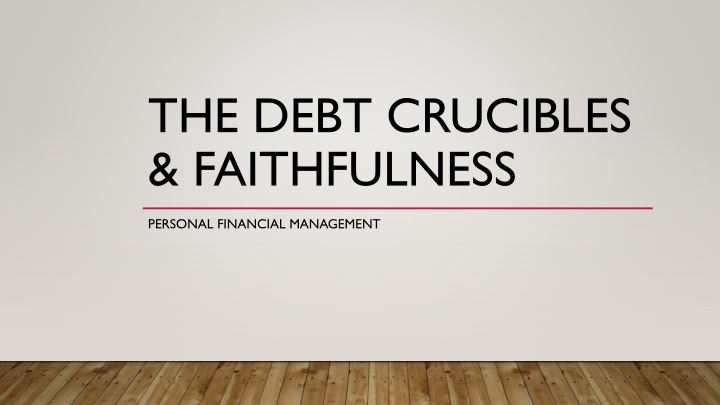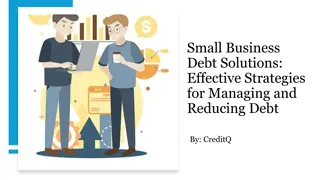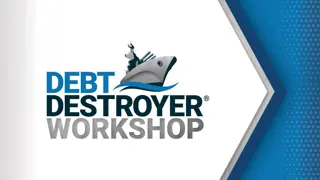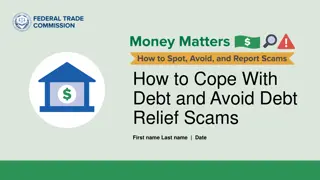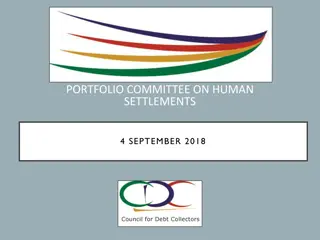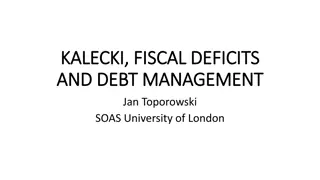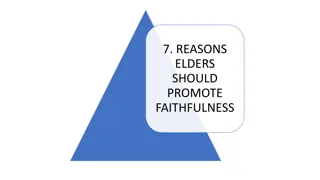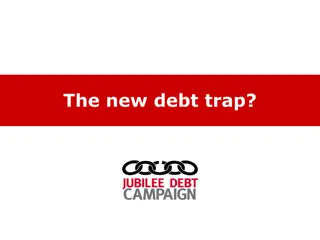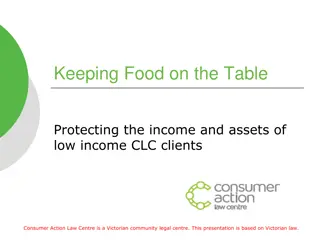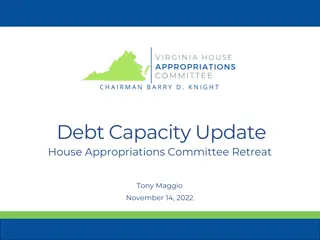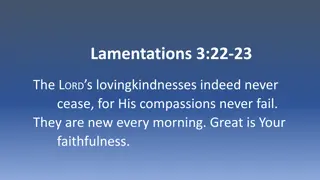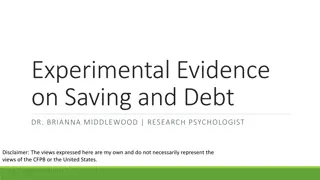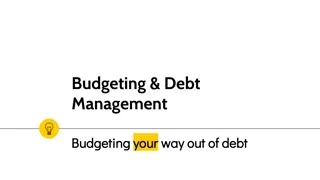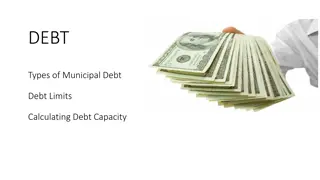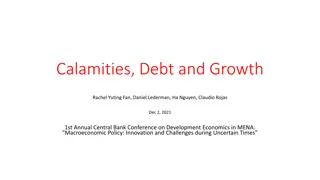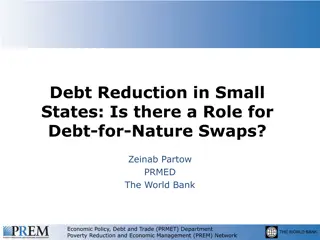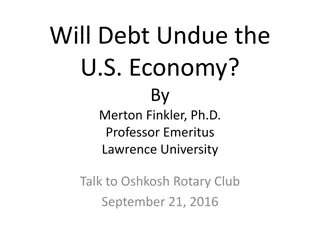Insights on Debt Management and Financial Faithfulness
Explore the core principles of personal financial management, debt crucibles, and debt-related observations in today's society. Understand the impact of debt on individuals, recognize signs of debt problems, and learn essential guidelines for maintaining financial health and faithfulness.
Download Presentation

Please find below an Image/Link to download the presentation.
The content on the website is provided AS IS for your information and personal use only. It may not be sold, licensed, or shared on other websites without obtaining consent from the author.If you encounter any issues during the download, it is possible that the publisher has removed the file from their server.
You are allowed to download the files provided on this website for personal or commercial use, subject to the condition that they are used lawfully. All files are the property of their respective owners.
The content on the website is provided AS IS for your information and personal use only. It may not be sold, licensed, or shared on other websites without obtaining consent from the author.
E N D
Presentation Transcript
THE DEBT CRUCIBLES & FAITHFULNESS PERSONAL FINANCIAL MANAGEMENT
BASIC PRINCIPLES (G.E. REID) God is the owner of everything Gen. 1:1; Psa. 24:1, 2; Psa. 50:12; 1Tim. 6:7 Our purpose in life is to glorify God 1Cor. 10:31; Isa. 43:7, 21; Col. 1:16 The tithe is the minimum testimony of our Christian commitment 1John 2:3, 4; John 14:15; 15:14 Debt is bad Prov. 22:7; Rom. 13:8 Prosperity is having what you need when you need it Phil. 4:11, 12; 1Tim. 6:8; Heb. 13:5
OBSERVATIONS TODAY Auctions Flourishing (Adverts in the media) Bankruptcy Repossessions of cars and properties - a consistent media feature Debt Counseling, a steady profession Over the past 4 years Consumers with assets (Cars/Homes) seeking Debt Counseling increased from 49-56%. Fin24 2019 Average Age of Consumers looking for Debt Relief is 37 years, women 47%. 21% Increase from 2018 for Consumers applying for Debt Review in 2019. Fin24 2019 NCR reports almost Half of ALL consumers were 3 months or more, Behind in Repayments. Fin24 2019 72.8% of Household Income services Debt in 2019, 71.9% in 2018. Tracking Economics 2019 Consumers with impaired [credit] records rose to 10.16mil during the quarter. Bus Day 28/5/2019
OBSERVATIONS TODAY CONT. FIN24 NOV. 2019 25-39 years age group is Most Active Borrowers. 40-59 years take on Larger Loans on average. Overall Debt Levels Total Debt exposure to Annual Income have increased 107%. Those who earning less than R5000 p.m. need 63% of Income to Repay their Creditors. Those who earn R20000 p.m. have Debt Levels of an average 133% of their Annual Net Income. Black Friday and Christmas are the Culprits getting Consumers into Debt.
THE DEBT CRUCIBLES Debt is slavery Proverbs 22:7. Be Debt-Free Rom. 13:8 Amplified Bible. Debt is humiliation by day and worry by night. The Koran. Debt leads to bankruptcy. Debt is self-inflicted tragedy and woe! Debt is bad; easy to get, difficult to get loose of! Debt is insidious, it creeps up on us slowly (especially high interest credit cards) before we know it. Avoid it (debt) as you would the smallpox E.G. White. Debt may affect your relationships at home and work: Irritability is a common sign, probably due to stress. Debt can add or lead to stress. Performance at work may be affected. Debt has claimed some lives!!!
SIGNS OF DEBT PROBLEMS Using more and more income to settle debts. Paying only minimum required for loans and credit cards. Money used to pay things not planned for. Pay bills late or avoiding to open statements. Irritable when spouse asks about savings. Agency or stores calling for unpaid bills. Put off doctor s visit due to affordability. Use one credit card to pay another or draw cash from credit card. Regular use of overdraft facility Consolidating debts on your bond (extends payment period). Worrying about money at least once a day. No savings or spare cash.
WHY FAMILIES FAIL IN FINANCIAL MANAGEMENT (GE REID) Financial factors contribute to most of family break-ups. Most families overspend every month. Most spend thousands per annum on interest (excluding mortgage loans). The major culprit on finances facing most families is not the amount of money they make, but rather their ignorance of how to handle, manage it, combined with planning habits. Very few families have a family or individual budget. Lack of family financial planning.
BIBLICAL FOCUS Scripture refers +1600 times to money and possessions. (GE Reid) +2/3 of Jesus parables deal with money or possessions. (GE Reid) For what shall it profit a man if he gains the whole world, and lose his own soul Mark 8:36,37 The love of money, the desire for wealth, is a golden chain that binds people to Satan Steps to Christ p.44 Beloved, I wish above all things that thou mayest prosper 3John 2 Watch out! Be on your guard against all kinds of greed; life does not consist in an abundance of possessions. Luke 12:15 Those who want to get rich fall into temptation and a trap and into many foolish and harmful desires that plunge people into ruin and destruction Some people, eager for money, have wandered from the faith and pierced themselves with many griefs. 1Tim. 6:9-10 read also 2Tim. 3:2
DEBTBUSTERS QUARTERLY DEBT INDEX ENCA 6.6.2020 DEBT IS INCREASING ACROSS ALL INCOME EARNERS AT 18% HIGHER THAN THE PREVIOUS YEAR SAME TIME, ONLY TO TOP UP THEIR INCOME. THIS IS SAID NOT TO BE SUSTAINABLE AS DEFAULTING WILL SURGE!
SPIRITUAL DECLINE When stressed with Debt often debtors duck and dive. Duck and Diving Debtors often change Cell numbers. Debtors do not answer phones. Unfaithfulness leads to death of one s spirituality. How do you PRAY under these unfaithful circumstances? How do you STUDY the WORD that condemns your action? It is SIN to borrow and not Pay! Psa 37:21; Eccl. 5:5. It is SIN to Vow and Fail to Honour the Vow. Deut. 23:21, 22.
FNB STATEMENT eNCA on 3rdDecember 2018, reported: Approximately, 56% of Middle Income Consumers in South Africa spend ALL their Monthly Income in 5 days or less.
EGW WARNINGS Christians seek to build as worldlings build, to dress as worldlings dress to imitate the customs and practices of those who worship only the god of this world. EGW: Comments in the Seventh-day Adventist Bible Commentary, vol. 2, p. 1013. Keep your lives free from the love of money and be content with what you have, because God has said, Never will I leave you; never will I forsake you. Heb. 13:5.
EGW WARNINGS Many poor families are poor because they spend money as soon as they receive it. CoS p269. Lack of budgeting or family budget causes impulse buying! You must see that one should not manage his affairs in a way that will incur debt When one becomes involved in debt, he is in one of Satan s nets, which he sets for souls ... AH p392. Abstracting and using money for any purpose, before it is earned, is a snare. Letter 63, 1897. (AH392).
OBSERVATIONS TODAY SOURCE: BMR 75% of Consumers run out of Money before Month-End; of those that do, 50% run out of Money by the 15th. Low Income Group represent 62.4% of population Affluent Group represent 5.5% of population 23% of Households rely on Government Grants account to 10% Spending. 54% of People live in Poverty, many of whom rely on Grants or daily incomes. Despite Increased Dependency, Smaller Households are growing. Single Households grew by 17% (2014 vs 2016) SA has the Highest Biggest number of Single parent Households in the World.
MIDDLE CLASS FEELS THE PINCH (INDEX OF 3M PEOPLE) BUSINESS TIMES 16 JUNE 2019, P.5 There are 1.3m middle class earning average R13741 take home, a drop from R13957 in April 18. Second and third jobs have become common as standard of living drops. Account Mgr, Chef and Events Caterer Social Media, DJ, Events Coordinator Middle class downgrading homes, cars and schools; downturn of luxury car sales. Employers asking staff to take salary cuts to save jobs (Moreso now with Covid-19). High tax brackets are eating into salary increases. Middle class turning to credit borrowing through unsecured loans.
SA MIDDLE CLASS STRESSES RESEARCH Debt Destroys Middle Class. 73% Experience Financial Stress The Middle Class is the spine of the economy and the tax base and a lot of South Africa s sustainability as a nation depends on this group. Almost a quarter of those experiencing financial stress said they were stressed all the time. The five most significant sources of financial stress were short-debt obligation (car payments, credit cards and personal loans), not being able to save for the future, not having enough for unanticipated emergencies, extended family financial obligations (Black Tax) or ad hoc requests for financial support and paying for school or university fees.
IMPLICATIONS OF FINDINGS RESEARCH The findings suggests that most middle class South Africans may be struggling to make ends meet in the short-term which may limit their ability to adequately provide for their retirement. Roughly 17% of respondents indicated that they have made no provision for retirement and consider themselves in trouble Over 60% said they would work beyond retirement age, while 73% said they would reduce their standard of living. If this was a disease this would be epidemic. If this was the flu, then 70% of South Africa said they ve got the flu at the same time. It would be headline news - Viresh Maharaj, CEO Sanlam Employees Benefits: Client Solutions 2017 Sanlam Benchmark Survey (The Citizen May 10, 2017 p. 3)
PRINCIPLES OF BORROWING EG REID Borrow as little as possible. Make the payback term as short as possible. Avoid Hire Purchases of 24/36 months. Negotiate 6months interest-free accounts. Pay off your credit card every month-end (not 10% minimum). Have a fixed rate of interest for certainty. Fixing your interest rate on your home loan provides additional security during uncertain times allowing for greater cash flow certainty. G. Swain Be sure there is no prepayment penalty. Avoid personal surety. (Prov. 6:1,2; 11:15; 17:18) Shop for the money, spend smart: it is possible to find good quality and low prices if you shop around. Avoid Microlenders at all cost!!!!!
PRINCIPLES OF BORROWING LARRY BURKETT Debt is not the norm. Deut. 28:1,12 Do not accumulate long term debt. Do short term debt up to 7 years Pay more principal than interest Avoid surety and co-signing. Prov. 6:1,2; 11:15; 17:18 The borrower has an absolute commitment to pay. Eccl. 5:5 No duck and diving Sin to borrow and not repay. Psa. 37:21
STEPS TO A DEBT-FREE LIFE Draw Up a Realistic Budget. Have a Plan to Get Out Of Debt Be Financially Wise Know When to Buy goods Watch sales/promotions Negotiate Interest rates Ask for discounts and Shop around for competitive deals Live within Means/Budget If you can t pay Cash you don t Afford it (Use Debit Cards) Credit Card means it is out of reach UNLESS you can Pay Off in full Month-end
BUDGETING The key to a successful budget is commitment What we achieve by budgeting: Gives direction to family goals Helps making informed financial decisions Places control and discipline on spending Brings peace of mind faithful steward Provides for emergencies Brings professionalism in individuals You know what you are doing Instills organisation and planning Take responsibility, jointly Don t bury your head in the sand Do not leave everything to spouse
MONTHLY INCOME/EXPENSES (REMEMBER TITHES & OFFERINGS FIRST) Income Salary Rent Total Income Less Expenses Housing (Mortgage, Insurance, Electricity, Water & Rates, Telephone, Garden Services) 35% Food and Education 23% Cars (Instalments, Insurance, Fuel and oil, Maintenance and Repairs, Licenses and Registration) 17% Insurance (Life, Funeral, Medical Aid) 3% Debts (Credit Cards, Clothing, Loans) 5% Entertainment (Vacation, Eating out, Sports) 5% Savings 7% (includes 2% Black Tax) Miscellaneous (Doctor, Medication, Toiletries, Cosmetics, Domestic services, Subscriptions, Gifts) 5% Total Expenses Net Income
IT IS COVID-19 TESTING TIMES 100Ks are expected to be Jobless: Unemployment heading for 40%? Economy could contract by more than 10% depending on the Lockdown extensions. Businesses are Shutting Down Those remaining Salaries are likely to be cut. SA is in a Junk Status No Foreign Investment Attraction; No Job Creation. Government Debt more than 70% of GDP in Oct2019 Debt > R3tril Our Currency Lost value against the Dollar/Pound/Euro, BUT regained some losses! State to lose ~R285bn through SARS collections compromising future grants. God is Still the Answer He is in Charge.
CONSIDER SERIOUSLY DOWNGRADING YOUR LIFESTYLE If too Rough, Sell your Home for a Smaller property. You May even Consider an Apartment. When You Recover, You May Buy a Better Home Again. Those with More Than One Car May Consider Selling the Other Car, the same with Those with More than One Property Let Your Investments Work For You - Support you Now!!! Sell Your Big Car for your Small Affordable Asian Car. DO NOT WAIT FOR A SHERIFF to knock on Your Door to Repossess. Many Hang on to Possessions UNTIL the SHERIFF Knocks on the Door. Take Charge of Your Life Sister SD Story.
CRUNCH TIME OPTIONS Downgrade Your Lifestyle DSTV vs SABC (Or Cheaper Levels of DSTV) Medical Aid Check out non-applicable features of the Scheme Eliminate Luxuries from Groceries Consider Lease or Rent to Buying Property Consider Using Public Transport or Lift Club Ask for Reduction of your Car Insurance Premiums or Check out Competitors Ask for Reduction on your Bond Interest Rates
